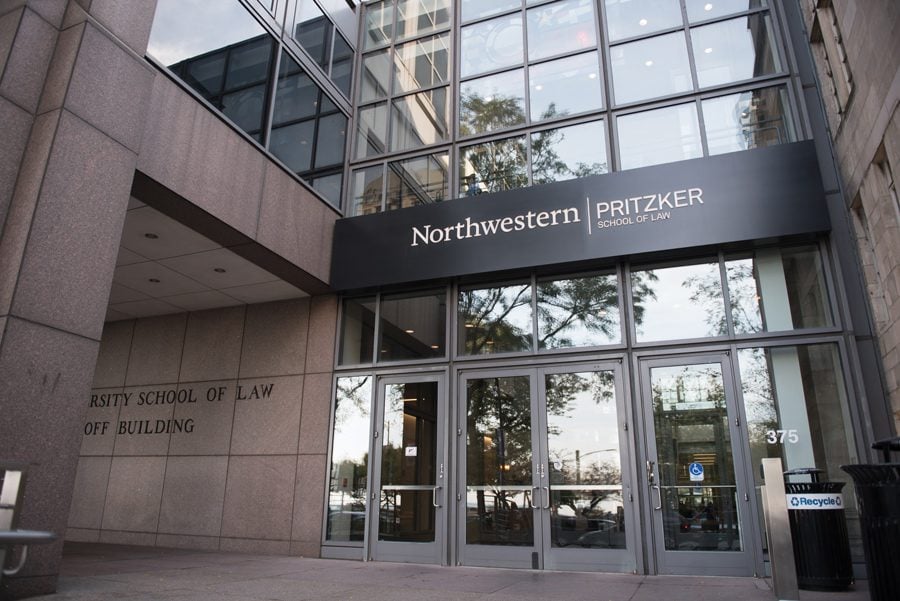NU Law alum faces Senate Judiciary Committee hearing fraught by ‘blue slip’ controversy
Daily file photo by Katie Pach
Northwestern Pritzker School of Law. Michael Brennan, a School of Law alumnus, was nominated for a federal court position by President Donald Trump, but faced controversy in his hearing before the Senate Judiciary Committee.
January 29, 2018
Northwestern alumnus Michael Brennan (School of Law ’89) faced a hearing before the Senate Judiciary Committee on Wednesday after being nominated for a federal court position by President Donald Trump.
Brennan, currently a partner at a Milwaukee law firm, was nominated for an empty seat on the United States Court of Appeals for the Seventh Circuit, which covers Illinois, Indiana and Wisconsin. The seat has been vacant since 2010 — though former President Barack Obama nominated Victoria Nourse for the position in July 2010, her hearing was halted by the Republican-headed committee at the time.
Some committee members highlighted Brennan’s extensive experience as a lawyer and his “exemplary resume” — including his NU Law degree.
“Mr. Brennan comes to the committee today with bipartisan support and an impressive legal career, including experience in both the public and private sectors,” said Sen. Chuck Grassley (R-Iowa), the committee’s chairman, during the hearing.
Even before the questioning began, though, Brennan’s hearing was fraught with controversy regarding the “blue slip” protocol of the Judiciary Committee. In a century-old protocol, both senators from a nominee’s home state receive blue slips allowing them to express or withhold approval for the nomination. Though not an official rule, the tradition has generally been upheld that if both blue slips are not returned with a positive response, the nominee would not receive a hearing.
In Brennan’s case, while Sen. Ron Johnson (R-Wis.) returned a positive blue slip, Sen. Tammy Baldwin (D-Wis.) declined to return hers. However, Grassley decided to proceed with the hearing, leading to heavy criticism from Democratic members of the committee.
Sen. Dianne Feinstein (D-Calif.) pointed out that since the protocol was created in 1917, a Democratic chairman has never continued with a hearing of a Democratic nominee over the objections of a Republican senator. In the former consideration of the same seat, Nourse, Obama’s nominee, had failed to receive a positive blue slip from Johnson, and as a result never received a hearing and eventually withdrew her nomination.
Sen. Sheldon Whitehouse (D-R.I.) added that he found the choice to proceed with Brennan’s hearing to be a “particularly egregious” case of the Republican majority tearing down the “valuable” blue slip tradition.
“I think it’s a very bad move for the Senate. I think it’s a very bad move for bipartisanship,” Whitehouse said. “And it continues to raise the question of, ‘What’s the big deal that makes everybody so desperate to jam judges through that in this case … they’re even willing to destroy the blue slip process?’”
Over the course of the hearing, Brennan faced questions from committee members on topics from the consideration of precedents in court decisions to potential changes to sentencing in light of the opioid crisis in the U.S. He expressed his stance as an originalist with regard to the U.S. Constitution, and his commitment to making sure in a busy court that “justice delayed is not justice denied.”
When questioned by Sen. Cory Booker (D-N.J.) about whether implicit racial bias existed in the judicial system, though, Brennan replied that he was not familiar enough with the data to express a position.
“You’re a judge in the United States of America and you have not looked at issues of race in sentencing and the criminal justice system?” Booker replied. “I find this astonishing.”
Email: madelineburakoff2020@u.northwestern.edu
Twitter: @madsburk


